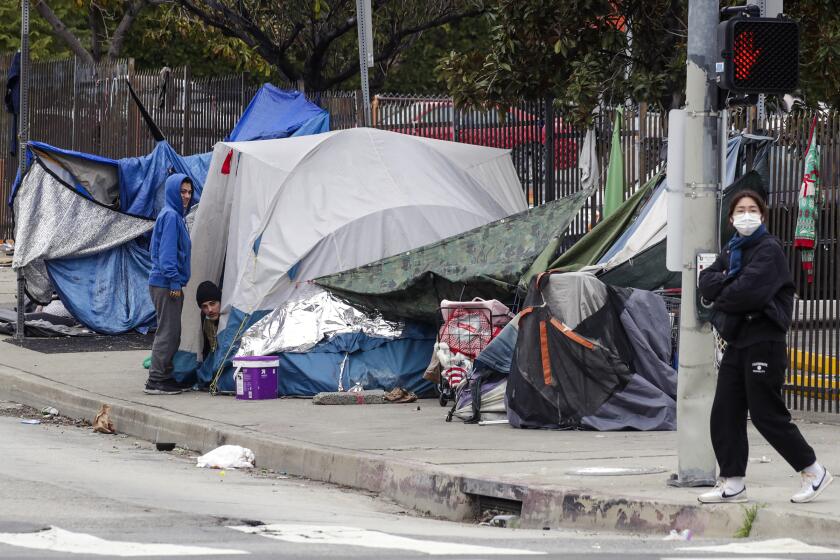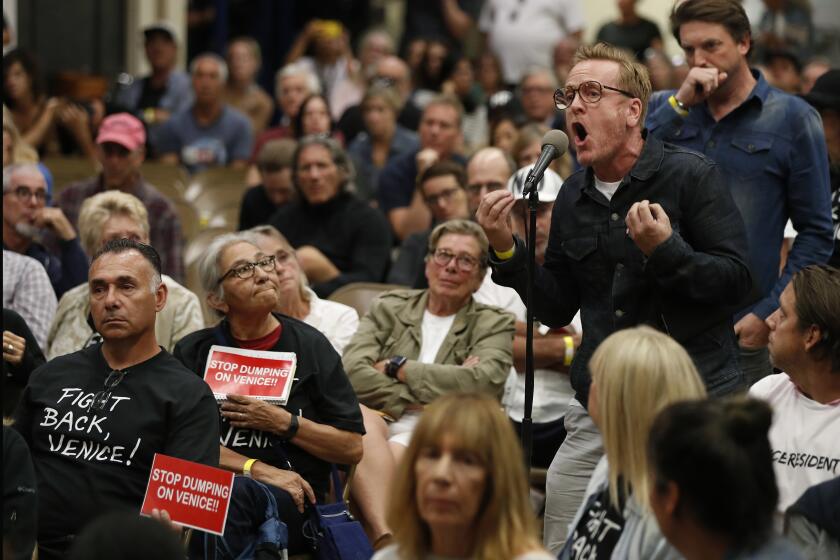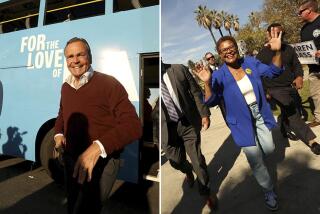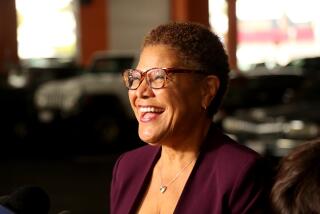Column: At City Hall, where promises die and tents abound, waiting on a new mayor to lead the way
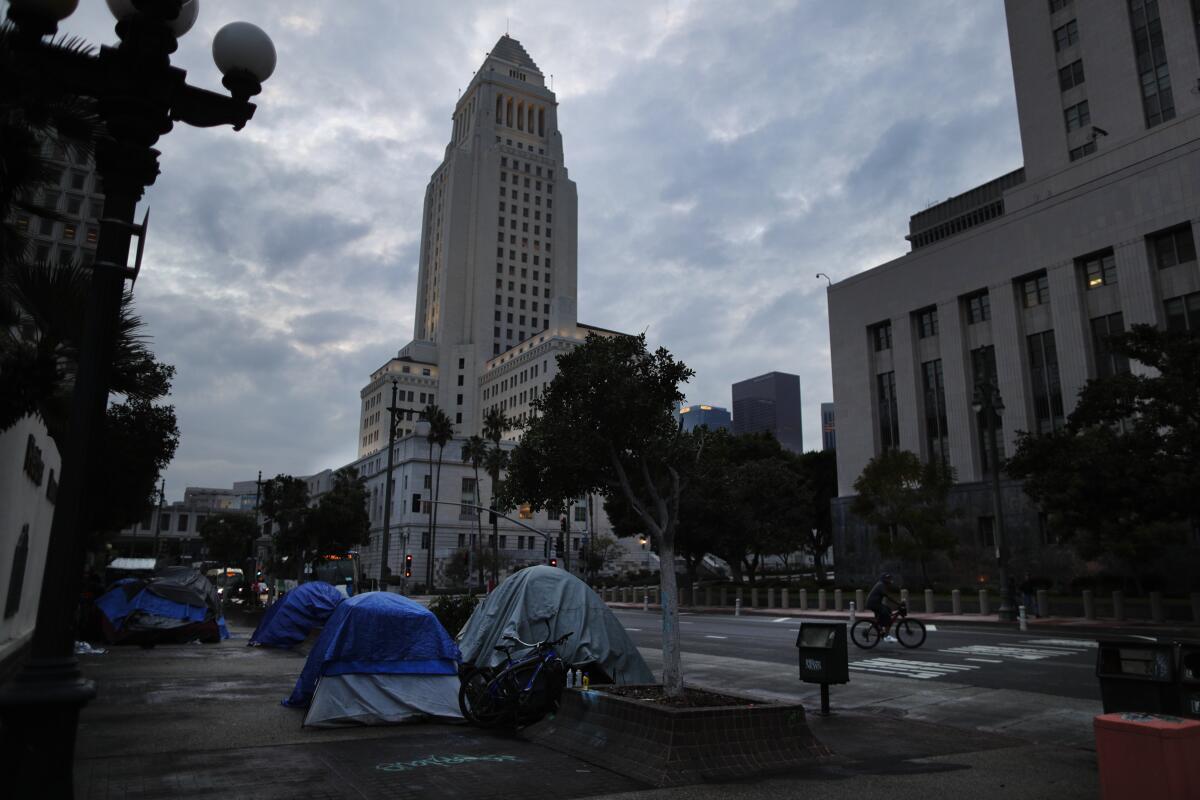
- Share via
In the 1980s, when I moved from California to Philadelphia, I knew immediately that I was going to have fun being a columnist.
City officials illegally parked their cars on the sidewalk at City Hall, where weeds sprouted from cracks, federal investigators probed corruption, and a vendor sold fresh popcorn. I began calling City Hall the Big Top.
When I moved to Los Angeles 21 years ago, I didn’t know that in some ways I’d find the same circus in a different tent.
Just in the recent past, one councilman has gone to prison, two more have been indicted and the mayor is trying to bail out early to join the foreign service but finds himself dogged by claims that he overlooked an alleged sexual predator in his administration.
And then there’s the state of our streets. Not just around the city but in the blocks around the halls of power.
“It’s just so sad,” Nicholas Salazar said after skirting a row of tents while walking east on 1st Street.
A retired welder who’s still nursing a back injury suffered during his military service, Salazar was on his way to a medical appointment. He came upon the intersection of 1st and Spring, where another row of tents lined the sidewalk directly across from City Hall.
Salazar asked what I thought of the situation, and I said that when the streets around City Hall are full of tents, it’s hard to have faith that anyone in the building can deliver a fix. I asked Salazar who he liked in the upcoming mayoral campaign.
Voters are angrier than ever about homelessness and aren’t confident elected officials can adequately address the crisis, a survey of focus groups finds.
“Well,” he said, “the thing is, everybody makes all kind of promises and then when they’re elected, nobody does nothing.”
It’s not that they do nothing. It’s that despite their best efforts, we keep losing ground.
But it’s time to pay close attention now, because a new season of promises by wannabe supervisors, mayors and council members has just begun. With Friday’s filing deadline now behind us, the headline is that after years of flirting with the idea, developer Rick Caruso is putting his money where his mouth is and jumping into the L.A. mayoral derby.
“I believe in the L.A. dream — and I know that we can end homelessness, crime and corruption. But the politicians can’t,” Caruso tweeted after formally declaring his intention to run.
If he doesn’t change his mind, will voters believe that a billionaire philanthropist and developer of luxury housing and lodging has what it will take to tackle a mess of deep-seated problems given limited mayoral authority and a bureaucracy like a snake’s nest?
On my travels around City Hall on Thursday, after watching half a dozen uniformed police officers oversee the cleanup of an encampment kitty-corner from City Hall — with mounds of trash being hauled away — I bumped into another candidate for mayor.
“Rick has never run a public thing in his life,” City Atty. Mike Feuer said of Caruso.
OK, let the sniping begin.
“He’s a mall developer who walks in and says, ‘Oh, I can fix all this stuff.’ And we’ve heard that many times before,” Feuer said.
But as noted, we’ve heard plenty of promises from career politicians. And Feuer was a councilman and state legislator before getting elected to his current job.
If you look at the recent survey by the Committee for Greater L.A., a series of interviews with voters reveals — unsurprisingly — that there’s a sense of compassion, anger, frustration and impatience out there. And little faith in those who currently hold public office.
“You know there’s hope for a Caruso candidacy because voters are uniformly fed up with the political class in Los Angeles,” said Darry Sragow, a political consultant who worked on the survey project.
A white male voter who participated in the survey had this to say: “I’ve been here 35 years, and the past five years, the degradation of life in L.A. is exponential, and I don’t see an end. The politicians are doofuses.”
A Black male voter said this: “It just pisses me off, because California is the fifth-largest economy in the world. Why can’t we do anything?”
Miguel Santana, a former city and county executive, summed up the survey like this:
“Angelenos want to be told the truth by an accountable, coordinated, independent entity in charge. They have compassion for the unhoused suffering from addiction and mental illness. Angelenos’ anger is toward the lack of a system to provide them treatment and house people, not the homeless themselves.”
In my chat with Feuer, he argued that he’s the guy for that job. He told me he’s been saying for years that Los Angeles needs a homeless czar, that the crisis on the streets should be treated as if it were a FEMA emergency, and that improved coordination between city and county government is desperately needed, along with more of every type of housing.
“Right now, we don’t have a good estimate of how many people on the streets are suffering some degree of mental illness requiring acute psychiatric care … and we don’t know how many people are addicted,” Feuer said. Without such information, he said, it’s hard to develop a vision, lay out a plan and deliver policies that benefit the housed, the unhoused and businesses.
A few feet away from where I spoke to Feuer, a guy named David Russo told me he doesn’t know who’s running for mayor, but he knows what he needs.
“Housing,” he said. “I’ve been homeless for eight years.”
Russo told me he’s been on a waiting list for Section 8 housing for years, and doesn’t expect to have keys in his pocket for at least two or three more years.
Memories of a raucous 2018 town hall on homelessness linger in Venice as candidates line up to replace departing Councilman Mike Bonin.
So which candidate for mayor would be better positioned to wrangle more federal assistance, and to win the support of jaded voters?
When I wrote about Caruso’s chances two weeks ago, local political commentators wondered whether a white billionaire can draw enough support — no matter how much money he pulls out of his pockets to finance his campaign — in a city that’s increasingly diverse and defined by epic income disparity.
The lineup of strong candidates includes a Black woman, U.S. Rep. Karen Bass, and City Councilman Kevin de León. Then there’s Councilman Joe Buscaino, who staked out his turf months ago when he vowed to crack down on encampments in the interest of both the housed and the unhoused.
It’s early in the race, of course. But political consultant Bill Carrick thinks it could shape up as a battle between the onetime Republican Caruso, who just put a D in front of his name, and progressive Bass.
“The challenge for Rick is introducing himself to L.A. city voters on his terms,” Carrick said. “The challenge for Karen is building a citywide coalition beyond her current support.”
Neither of them has a command of the issues around homelessness the way he does, Feuer argued. But if he’s going to be competitive, it means overcoming the fact that his office is the subject of an ongoing federal criminal investigation related to the billing scandal at the Department of Water and Power.
Feuer has not been implicated and told The Times he has “always acted appropriately.” But it remains to be seen whether he’ll be tainted by the probe at a time when voters have had it with corruption.
As I spoke to Feuer outside City Hall, the cleanup crews continued working nearby, and homeless people scattered with their belongings in tow.
“They’ll be back later,” Feuer said.
Guaranteed.
More to Read
Sign up for Essential California
The most important California stories and recommendations in your inbox every morning.
You may occasionally receive promotional content from the Los Angeles Times.

